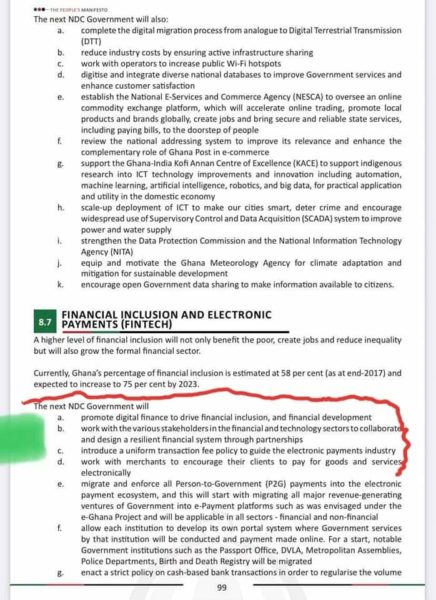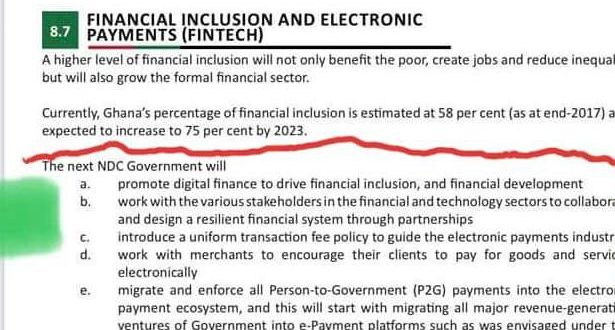It is turning out that the opposition National Democratic Congress (NDC) in their 2020 Manifesto, promised to introduce some form of Electronic Transaction which their opponent the New Patriotic Party (NPP) administration is currently pursuing amid stiff resistance from the NDC.
The ‘E-Levy’ policy proposal which the NDC did not name at the time, was captured on Page 99 on point 8.7 under Financial Inclusion and Electronic Payments (FINTECH) in their 2020 People’s Manifesto.
In what appears similar to the E-Levy, the NDC had proposed among other things that the next NDC government “will introduce a uniform transaction fee policy to guide the electronic payments industry.”
They also said the next NDC government will “work with merchants to encourage their clients to pay for goods and services electronically.”
They promised to “promote digital finance to drive financial inclusion, and financial development,” as well as “work with the various stakeholders in the financial and technology sectors to collaborate and design a resilient financial system through partnerships.”
The NDC also promised to “migrate and enforce all Person-to-Government (P2G) payments into the electronic payment ecosystem, and this will start with migrating all major revenue-generating ventures of Government into e-Payment platforms such as was envisaged under the e-Ghana Project and will be applicable in all sectors – financial and non-financial,” and also “allow each institution to develop its own portal system where Government services by that institution will be conducted and payment made online. For a start, notable Government institutions such as the Passport Office, DVLA, Metropolitan Assemblies, Police Departments, Birth and Death Registry will be migrated.”
They said they will “enact a strict policy on cash-based bank transactions in order to regularise the volume of cash transactions that can be made at banks’ branches and via the ATMs,” and “ensure a strong protection regime by building strong safety measures for victims of fraud in the IT ecosystem.”

The NDC made the proposals towards ensuring that “a higher level of financial inclusion will not only benefit the poor, create jobs and reduce inequality but will also grow the formal financial sector,” and even said at the time that “currently, Ghana’s percentage of financial inclusion is estimated at 58 per cent (as at end-2017) and expected to increase to 75 per cent by 2023.”
Hypocritical Stunt
The NDC’s sudden U-turn and the stiff opposition they have mounted following the introduction of the E-Levy by the NPP administration has been described as ‘hypocritical’ by their opponents.
Since the Akufo-Addo-led NPP administration through Finance Minister Ken Ofori-Atta, presented the 2022 Budget Statement on November 17, last year, the NDC through their MPs have caused chaos at every step towards the approval of the policy.
Parliament has already approved the entire budget estimates and the accompanying appropriation; the Majority Leader Osei Kyei-Mensah-Bonsu said that technically the E-Levy has been passed because most of the estimates are tied to revenue that are going to accrue from the levy when passed.
The Electronic Transaction Levy (E-Levy), when approved, is expected to come into effect on February 1, 2022, and there will be a charge of 1.75% of the value of electronic transactions, particularly Mobile Money (MoMo) transactions.
The Finance Minister, presenting the budget had said that, “Electronic transactions covering mobile money payments, bank transfers, merchant payments and inward remittances will be charged at an applicable rate of 1.75% which shall be borne by the sender except for inward remittances, which will be borne by the recipient.”
Per the arrangement, a sender, and not the receiver, would bear the cost of the 1.75 per cent charge on e-transactions that are above GH¢100.
Despite many other goodies in the budget which experts say is forward-looking, the E-Levy component in the budget has especially triggered accusations and counter-accusations often along partisan lines.
Ken Ofori-Atta and his team on the side of the NPP government decided to name the 2022 budget the ‘Agyenkwa’ (Saviour) Budget whilst the opposition NDC cynically termed it ‘Awudie’ (Killer) Budget.
NDC MPs in Parliament resolved to see the failure of the 2022 Budget Statement and Economic Policy of the Government and vowed to reject it following series of meetings held.
In late November last year, the Majority NPP had to nullify the purported rejection of the budget by opposition NDC MPs on Friday, November 26, as supervised by the Speaker of Parliament, Alban Bagbin, who is a card-bearing member of that political grouping.
Fierce Fight
The NDC MPs on two occasions instigated nasty scenes on the floor of the House, similar to what happened on the night of January 7 when a new Speaker as well as the new Parliament was being sworn in.
The NDC has been going round the country instigating the public to reject the E-Levy whilst the NPP administration has also been holding town hall meetings to explain the benefits of the levy.
By Ernest Kofi Adu
The post E-Levy Found In NDC 2020 appeared first on DailyGuide Network
 HEROESNEWSGH The Biggest Gh News Platform
HEROESNEWSGH The Biggest Gh News Platform





